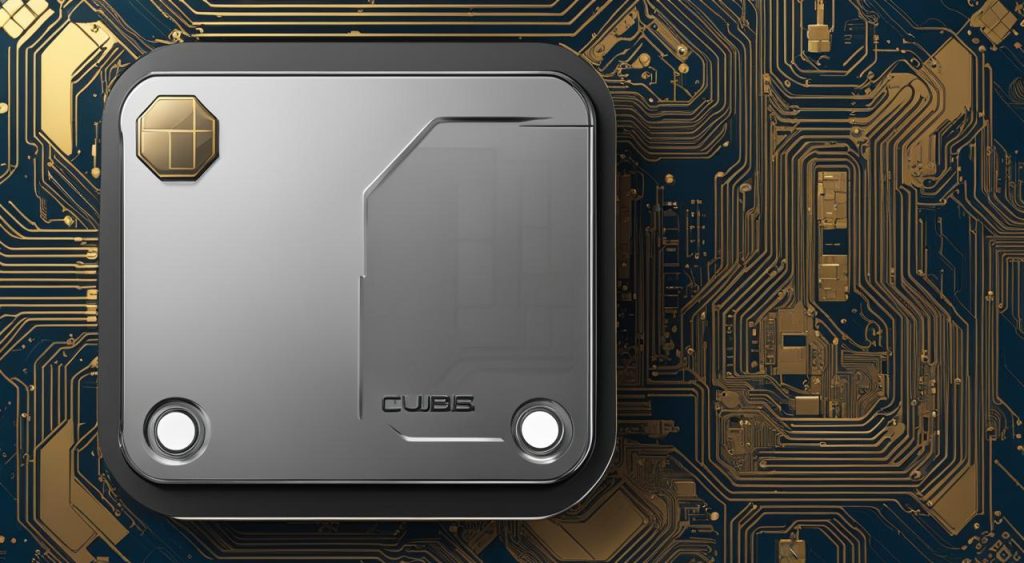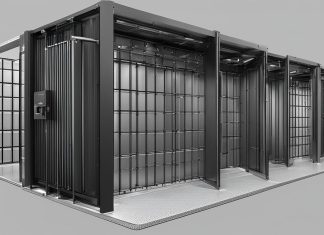Cryptocurrency investments have seen remarkable growth in recent years, and as more people enter the world of blockchain technology, the security of their digital assets becomes of utmost importance. Hardware wallets, also known as cold storage wallets, offer a secure method to protect cryptocurrencies from cyber threats. Choosing the right hardware wallet is crucial for safeguarding your crypto assets. In this article, we will explore the top hardware wallets in 2023 to ensure the safety and security of your digital investments.
Key Takeaways:
- Hardware wallets, also known as cold storage wallets, provide secure storage for cryptocurrencies.
- They protect against online threats by keeping private keys offline and isolated from internet-connected devices.
- When choosing a hardware wallet, consider factors such as security features, build quality, user experience, supported cryptocurrencies, associated software, and community reviews.
- Top hardware wallets in 2023 include Ledger Nano X, Trezor Model T, Coldcard Wallet, KeepKey, SafePal S1, and BitBox02.
- Always choose a hardware wallet that best suits your specific needs and requirements.
What are Crypto Hardware Wallets?
Crypto hardware wallets, also known as cold wallets, are physical devices designed to securely store cryptocurrency private keys offline. These wallets offer protection against online threats like hacking and malware by keeping private keys isolated from internet-connected devices. To execute a transaction, users connect their hardware wallet to a device, sign the transaction offline for utmost security, and then broadcast it online. This ensures that private keys remain inaccessible even if the connected device is compromised. Hardware wallets are widely recognized as a top-tier security measure for crypto investors.
There are several key characteristics that make hardware wallets a secure method for storing cryptocurrencies. The most important feature is the offline storage of private keys. Since hardware wallets are not connected to the internet, they are not susceptible to attacks from hackers or malware that target online wallets. This provides users with a higher level of protection for their digital assets.
In addition to offline storage, hardware wallets use advanced cryptographic techniques to secure private keys. These techniques ensure that even if the physical device is compromised, it is nearly impossible for hackers to access the private keys without the owner’s permission. This adds an extra layer of security to protect against physical attacks.
Hardware wallets are the preferred choice for crypto investors who prioritize security. By storing private keys offline and utilizing advanced cryptographic techniques, hardware wallets offer a secure method for managing and safeguarding cryptocurrencies.
Things to Consider While Choosing Crypto Hardware Wallets
When it comes to choosing a crypto hardware wallet, there are several important factors to consider. These factors ensure that you select a wallet that prioritizes security, offers a seamless user experience, and accommodates your specific cryptocurrency needs.
Security Features
One of the most critical aspects to consider is the security features of the hardware wallet. Look for wallets that offer robust security measures, such as advanced cryptographic techniques and offline storage capabilities. Offline storage ensures that your private keys are kept away from internet-connected devices, protecting them from online threats like hacking and malware.
Build Quality
Another factor to consider is the build quality of the hardware wallet. A well-constructed wallet is essential to prevent physical tampering and ensure the longevity of the device. Look for wallets that are durable and resistant to potential damage.
User Experience
The user experience of the hardware wallet is also crucial. You want a wallet that is intuitive and easy to use, with clear instructions and prompts. A smooth user experience will make it easier for you to manage your cryptocurrencies and execute transactions securely.
Supported Cryptocurrencies
Consider the range of supported cryptocurrencies offered by the hardware wallet. Ensure that the wallet supports the specific cryptocurrencies you own or plan to invest in. Having broad compatibility will future-proof your investment.
Associated Software and Community Reviews
Lastly, evaluate the associated software of the hardware wallet. Look for wallets that offer seamless integration with popular cryptocurrency software and exchanges. Regular software updates are also important to ensure the wallet remains secure and up to date. Additionally, take into account community reviews and feedback. Real-world insights from other users can provide valuable information on the reliability and performance of the hardware wallet.
By considering these factors – security features, build quality, user experience, supported cryptocurrencies, associated software, and community reviews – you can make an informed decision when choosing a crypto hardware wallet that best suits your needs and helps protect your digital assets.

List of Top Hardware Wallets in 2023
In 2023, several hardware wallets have emerged as top contenders for safe crypto storage. These wallets offer a combination of robust security measures, extensive cryptocurrency support, and a seamless user experience. Here are the top hardware wallets to consider:
Ledger Nano X
The Ledger Nano X is a popular choice for secure cryptocurrency storage. It features state-of-the-art security features, including secure chip technology and a built-in certified secure element. With its Bluetooth connectivity and large capacity, it offers convenient access to multiple cryptocurrencies while ensuring the utmost protection of your digital assets.
Trezor Model T
The Trezor Model T is another top-tier hardware wallet that prioritizes security. It utilizes a touch screen and advanced encryption to safeguard your private keys. The device is compatible with a wide range of cryptocurrencies and integrates seamlessly with popular wallets and exchanges. With its user-friendly interface and regular firmware updates, the Trezor Model T offers a reliable and secure option for crypto storage.
Coldcard Wallet
The Coldcard Wallet is renowned for its focus on privacy and security. It features an air-gapped design, ensuring that your private keys are never exposed to the internet. With its open-source firmware and support for Bitcoin-based cryptocurrencies, the Coldcard Wallet offers robust protection against cyber threats and is highly regarded by the crypto community.
KeepKey
KeepKey is a sleek and easy-to-use hardware wallet that offers top-notch security for your digital assets. It features a large, high-resolution display, making it convenient to verify transaction details. The wallet supports over 40 cryptocurrencies and integrates with popular wallet apps. With its durable build and intuitive interface, KeepKey provides a secure and user-friendly solution for crypto storage.
SafePal S1
The SafePal S1 is a compact and affordable hardware wallet that doesn’t compromise on security. It features a secure chip and two-factor authentication, ensuring that your private keys are protected from unauthorized access. The wallet supports thousands of cryptocurrencies and offers an intuitive mobile app for convenient management of your crypto assets.
BitBox02
The BitBox02 offers a sleek and minimalist design without compromising on security. It utilizes a secure chip and open-source firmware to safeguard your private keys. The wallet is compatible with major operating systems and supports a wide range of cryptocurrencies. With its emphasis on security and simplicity, the BitBox02 is an excellent choice for secure crypto storage.
These top hardware wallets in 2023 provide robust security measures, extensive cryptocurrency support, and a seamless user experience. Whether you prefer the advanced features of the Ledger Nano X and Trezor Model T, the privacy-focused design of the Coldcard Wallet, the user-friendly interface of KeepKey, the affordability of the SafePal S1, or the minimalist approach of the BitBox02, there is a hardware wallet to suit your specific needs and preferences.
| Hardware Wallet | Security Features | Cryptocurrency Support | User Experience |
|---|---|---|---|
| Ledger Nano X | Secure chip technology, certified secure element | Wide range of cryptocurrencies | Convenient and user-friendly |
| Trezor Model T | Advanced encryption, secure touch screen | Compatible with various cryptocurrencies | Intuitive interface and regular updates |
| Coldcard Wallet | Air-gapped design, open-source firmware | Bitcoin-based cryptocurrencies | Highly secure and respected by the community |
| KeepKey | Large high-resolution display, durable build | Supports over 40 cryptocurrencies | Sleek design and easy to use |
| SafePal S1 | Secure chip, two-factor authentication | Thousands of cryptocurrencies | Compact and affordable |
| BitBox02 | Secure chip, open-source firmware | Wide range of cryptocurrencies | Sleek and minimalist design |
Frequently Asked Questions About Hardware Wallets
As cryptocurrency investments become more widespread, many investors are turning to hardware wallets to safeguard their digital assets. Here are answers to some frequently asked questions about hardware wallets:
1. Hardware Wallet vs Software Wallet: Which is Better?
A hardware wallet is generally considered more secure than a software wallet. While software wallets are convenient and accessible from any device, they are also more vulnerable to cyber threats. Hardware wallets, on the other hand, store your private keys offline, making it nearly impossible for hackers to access your funds. If security is your top priority, a hardware wallet is the recommended choice.
2. How to Handle Firmware Updates on a Hardware Wallet?
Firmware updates are important for keeping your hardware wallet up to date with the latest security features and bug fixes. To handle firmware updates, simply follow the instructions provided by the wallet manufacturer. Most hardware wallets have intuitive interfaces that guide you through the update process, ensuring a smooth and secure upgrade.
3. Can Hardware Wallets Support Multiple Cryptocurrencies?
Yes, many hardware wallets support a wide range of cryptocurrencies. Before purchasing a hardware wallet, make sure to check the list of supported cryptocurrencies on the manufacturer’s website. Popular hardware wallets often support the most widely used cryptocurrencies like Bitcoin, Ethereum, and Litecoin, as well as various ERC-20 tokens.
4. What to Do If Your Hardware Wallet Is Lost or Damaged?
If your hardware wallet is lost or damaged, don’t panic. As long as you have properly backed up your recovery phrase or seed, you can easily recover your funds by setting up a new hardware wallet and restoring your wallet using the recovery phrase. It’s crucial to keep your recovery phrase in a safe and secure location separate from your physical hardware wallet.
5. Is It Safe to Buy a Used Hardware Wallet?
While it’s generally recommended to buy a new hardware wallet to ensure its integrity, buying a used hardware wallet can still be safe under certain conditions. Make sure to purchase from a reputable seller and verify that the hardware wallet has not been tampered with. Additionally, be sure to reset the device and create a new recovery phrase to eliminate any potential security risks.
6. How Does the Hardware Wallet Interface Work?
The hardware wallet interface allows you to interact with your wallet using a computer or smartphone. When connected to a device, the hardware wallet provides a secure environment for signing transactions. The interface guides you through the process, displaying transaction details for your review before finalizing and broadcasting them.
7. What Protection Do Hardware Wallets Offer Against Physical Attacks?
Hardware wallets provide protection against physical attacks through various security measures. These may include tamper-resistant chips, secure element technology, and even self-destruct mechanisms. By utilizing these features, hardware wallets make it extremely difficult for attackers to extract the private keys or compromise the device’s integrity.
8. Are Hardware Wallets Compatible with Software Wallets and Exchanges?
Yes, hardware wallets are often compatible with software wallets and exchanges. They can be used in conjunction with software wallets for added convenience when managing your cryptocurrency portfolio. Additionally, hardware wallets are compatible with popular exchanges, allowing you to securely transfer funds between your hardware wallet and exchange accounts.
| Question | Answer |
|---|---|
| Hardware Wallet vs Software Wallet: Which is Better? | A hardware wallet is generally considered more secure than a software wallet. |
| How to Handle Firmware Updates on a Hardware Wallet? | To handle firmware updates, follow the instructions provided by the wallet manufacturer. |
| Can Hardware Wallets Support Multiple Cryptocurrencies? | Yes, many hardware wallets support a wide range of cryptocurrencies. |
| What to Do If Your Hardware Wallet Is Lost or Damaged? | If your hardware wallet is lost or damaged, you can easily recover your funds by setting up a new hardware wallet and restoring your wallet using the recovery phrase. |
| Is It Safe to Buy a Used Hardware Wallet? | While it’s generally recommended to buy a new hardware wallet, buying a used one can be safe if purchased from a reputable seller and taking necessary precautions. |
| How Does the Hardware Wallet Interface Work? | The hardware wallet interface allows you to interact with your wallet using a computer or smartphone. |
| What Protection Do Hardware Wallets Offer Against Physical Attacks? | Hardware wallets provide various security measures to protect against physical attacks. |
| Are Hardware Wallets Compatible with Software Wallets and Exchanges? | Yes, hardware wallets are often compatible with software wallets and exchanges. |
Conclusion
Securing your cryptocurrency investments with a top-tier hardware wallet is essential for safe crypto storage. The reviewed hardware wallets in this article provide robust security measures and extensive cryptocurrency support. With options like Ledger Nano X, Trezor Model T, Coldcard Wallet, KeepKey, SafePal S1, and BitBox02, you can ensure the security of your digital assets.
Hardware wallets offer a secure method for storing your cryptocurrencies, protecting them from cyber threats. These wallets, also known as cold storage wallets, keep your private keys offline, away from online threats like hacking and malware. By keeping your private keys isolated from internet-connected devices, hardware wallets provide an extra layer of security.
When choosing a hardware wallet, consider important factors like security features, build quality, user experience, supported cryptocurrencies, associated software, and community reviews. Evaluate whether the wallet offers offline storage and advanced cryptographic techniques. The wallet should have a solid build quality to prevent physical tampering. User experience should be intuitive, with clear instructions and prompts.
To conclude, ensure the safety and security of your digital investments by choosing a top-tier hardware wallet. These wallets offer robust security measures, extensive cryptocurrency support, and seamless user experiences. Safeguard your crypto assets with the best hardware wallet suited to your needs.
FAQ
What are the benefits of using a hardware wallet?
Hardware wallets, also known as cold storage wallets, offer a secure method to protect cryptocurrencies from cyber threats. They keep private keys offline, protecting against hacking and malware. Hardware wallets are widely recognized as a top-tier security measure for crypto investors.
What should I consider when choosing a hardware wallet?
When choosing a hardware wallet, consider factors such as security features, build quality, user experience, range of supported cryptocurrencies, associated software, and community reviews.
Which hardware wallets are considered the top contenders for secure crypto storage in 2023?
The top hardware wallets this year include Ledger Nano X, Trezor Model T, Coldcard Wallet, KeepKey, SafePal S1, and BitBox02.
What are crypto hardware wallets?
Crypto hardware wallets, also known as cold wallets, are physical devices designed to securely store cryptocurrency private keys offline. They offer protection against online threats like hacking and malware.
How do hardware wallets protect against online threats?
Hardware wallets keep private keys isolated from internet-connected devices. To execute a transaction, users connect their hardware wallet to a device, sign the transaction offline, and then broadcast it online. This ensures that private keys remain inaccessible even if the connected device is compromised.
Can I use a hardware wallet for multiple cryptocurrencies?
Many hardware wallets support a wide range of cryptocurrencies. Be sure to check the compatibility of the hardware wallet with the specific cryptocurrencies you are interested in.
What should I do if my hardware wallet is lost or damaged?
If your hardware wallet is lost or damaged, you can recover your cryptocurrencies using the recovery seed provided by the wallet. It is essential to keep your recovery seed in a safe place, separate from your hardware wallet.
Is it safe to buy a used hardware wallet?
It is generally recommended to purchase a new hardware wallet from an authorized retailer to ensure the integrity and security of the device. Buying a used hardware wallet carries a higher risk of tampering or compromised security.
How does a hardware wallet interface with software wallets and exchanges?
Hardware wallets typically have their software interfaces to interact with software wallets and exchanges. These interfaces ensure secure communication and transaction signing between the hardware wallet and other software applications.
How can hardware wallets protect against physical attacks?
Hardware wallets are designed with tamper-resistant features to prevent physical attacks. They may include measures such as anti-tampering seals, secure chipsets, and encryption mechanisms to protect the private keys stored within the device.






